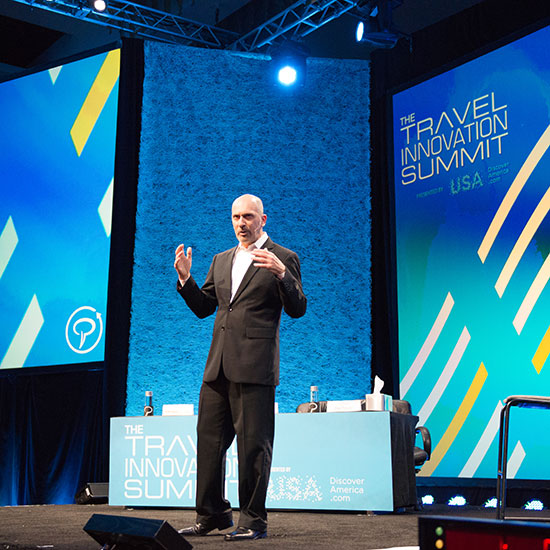This post may contain affiliate links. We may earn money or products from the highlighted keywords or companies or banners mentioned in this post.
11.26.14

Each year, T+L travels to the Phocuswright conference to hear about the latest in travel technology. This year’s gathering took place in Los Angeles at the JW Marriott at L.A. Live, where the crowd heard from major industry players as well as startups. The first day of the conference—the Travel Innovation Summit—is when some of the most intriguing new players present their new ideas and products, some of which are so fresh they’re launched at the show.
One of the most interesting takeaways? An increased focus on offline travel agents—either by building your itinerary and sending it to a live agent to price out (Going Somewhere), or, as TripScope is doing, letting users video chat with an agent to collaborate on a trip plan in real time.
Another popular concept undergoing a revival: walking tours. Groupon founder Andrew Mason presented his new company, Detour, which will lead people on immersive audio walking tours, using geo-location to trigger the narration. The first round of tours will all be professionally produced, and each will require a small fee, though they plan to open it up for users to create their own. Another company, Kamino, currently offers some 650 walking tours in 85 cities, though as they’re all user-generated, that number could escalate quickly.
This year also saw the first local Chinese company to present at the Innovation Summit. The company, Tripshow, allows brands to connect with their fans on any platform, and earn points by participating in campaigns—points that can then be redeemed for discounts.
And as always, there were some new concepts that we hadn’t even considered, like paying for travel with Bitcoin—which is what BTCTrip is doing. A good idea? We’ll let the marketplace be the judge of that.
And while some of these new products were created as potential tools for existing businesses, there could be interesting implications for all travelers if the technologies are adopted.
Here are some favorites:
Options Away. If you’re planning a trip with others, you may not want or be able to book a great airfare the instant you find it. For a small fee, Options Away will hold that reservation for anywhere from a day to a few weeks. It’s a great idea—that is, if you find that the fare from these guys is competitive with what you see elsewhere.
TapTap. Are hotel shuttles ready for an Uber-like shakeup? That’s what this company is betting on. Instead of waiting around at the airport for your shuttle to pick you up, you’ll be able to see exactly where the shuttle is and when it’s expected.
TableGrabber. While you won’t actually see the name of this product (it would be built into a restaurant’s reservations system), it might end up getting you a deal if you’re dining at off-times. That’s because restaurants could use it to monitor their reservations and offer discounts at certain slow times.
PassportCard. What’s a big problem with travel insurance today? According to this company, it’s the time it takes to pay out a claim. But these guys aim to change that with an insurance card that acts like a credit card and pays the health care providers in real time.
Mozio. When you get to an airport, should you take a taxi? Limo? Train? Shuttle? It’s always a question, since no one before Mozio has consolidated all the options in one place.
Which of these ideas will succeed, fail, or retool and reboot? Time will tell.
Rich Beattie is the former Executive Digital Editor at Travel + Leisure.
Photo courtesy of Phocuswright
Also on Travel + Leisure:
Meet Our Local Experts
World's Greatest Dream Trips
World's Best Hotels
Powered by WPeMatico











